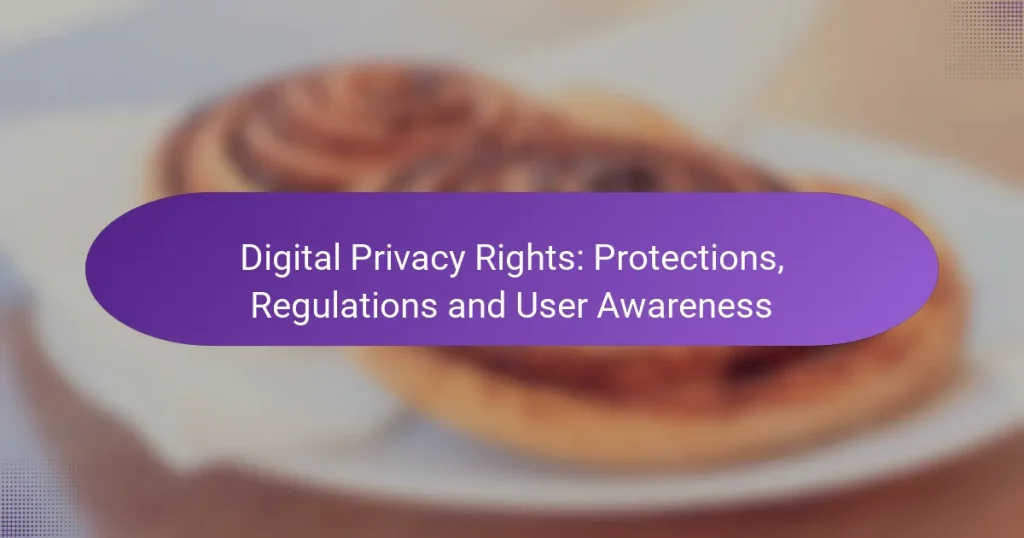Digital privacy rights are essential for individuals to maintain control over their personal information in an increasingly online world. These rights encompass access to, erasure, and portability of data, as well as consent for its processing. Various regulations, such as the GDPR in the European Union and specific laws in the US, aim to protect these rights by imposing transparency and accountability on businesses that handle personal data.
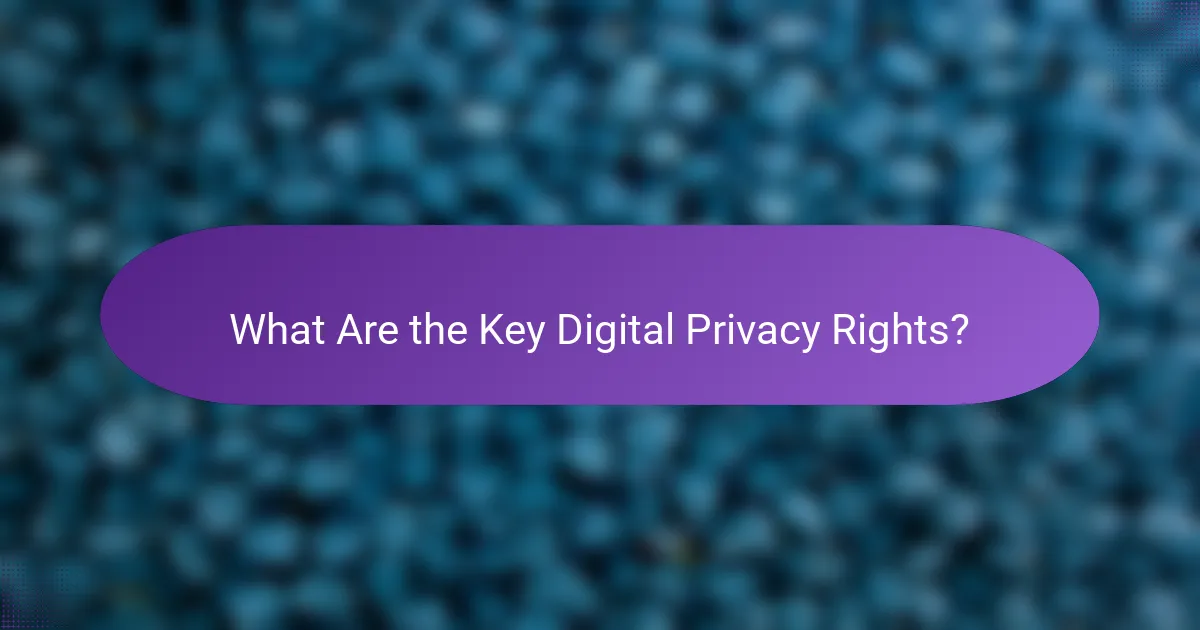
What Are the Key Digital Privacy Rights?
Key digital privacy rights empower individuals to control their personal information online. These rights include access to data, the ability to erase data, portability of data, consent for data processing, and the right to object to data use.
Right to Access Personal Data
The right to access personal data allows individuals to request and obtain information that organizations hold about them. This includes details on how their data is collected, processed, and shared.
To exercise this right, users can submit a formal request to the organization, which typically must respond within a month. It’s advisable to specify the data you want to access to streamline the process.
Right to Data Erasure
The right to data erasure, often referred to as the “right to be forgotten,” enables individuals to request the deletion of their personal data under certain conditions. This right is particularly relevant when data is no longer necessary for its original purpose or when consent is withdrawn.
Users should be aware that organizations may refuse erasure requests if the data is needed for legal compliance or other legitimate interests. It’s beneficial to provide clear reasons for your request to enhance its chances of approval.
Right to Data Portability
The right to data portability allows individuals to transfer their personal data from one service provider to another in a structured, commonly used format. This right facilitates greater control over personal information and encourages competition among service providers.
To utilize this right, users should check if the organization supports data portability and request their data in a compatible format, such as CSV or JSON. This can help in switching services without losing valuable data.
Right to Consent
The right to consent requires organizations to obtain explicit permission from individuals before processing their personal data. This ensures that users are informed about how their data will be used and can make choices accordingly.
Individuals should read consent forms carefully and be cautious of pre-checked boxes or vague language. It’s important to know that consent can be withdrawn at any time, which organizations must respect.
Right to Object
The right to object allows individuals to challenge the processing of their personal data in certain situations, particularly for direct marketing purposes. This right empowers users to opt out of data processing that they find intrusive or unwanted.
To exercise this right, individuals can contact the organization directly and specify their objection. It’s useful to keep records of such communications to ensure compliance and follow up if necessary.
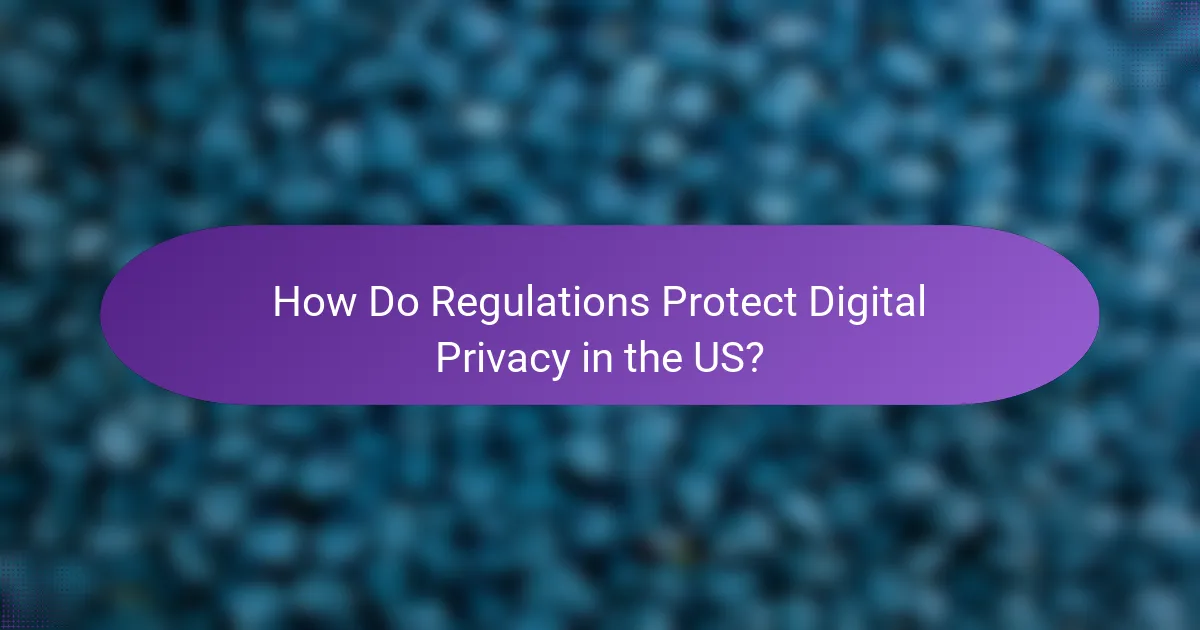
How Do Regulations Protect Digital Privacy in the US?
In the US, various regulations are designed to safeguard digital privacy by establishing guidelines for how personal information is collected, used, and shared. These laws empower consumers with rights over their data and impose obligations on businesses to ensure transparency and accountability.
California Consumer Privacy Act (CCPA)
The California Consumer Privacy Act (CCPA) grants California residents specific rights regarding their personal information. Under this law, consumers can request disclosures about the data collected about them, demand deletion of their data, and opt out of the sale of their information.
Businesses must comply with these requests and provide clear privacy notices. For instance, companies must inform users about the categories of personal data collected and the purposes for which it is used. Failure to comply can result in significant fines.
Health Insurance Portability and Accountability Act (HIPAA)
The Health Insurance Portability and Accountability Act (HIPAA) protects sensitive patient health information from being disclosed without the patient’s consent. This regulation applies to healthcare providers, insurers, and any entity that handles health data.
HIPAA mandates that covered entities implement strict safeguards to ensure the confidentiality and integrity of health information. For example, healthcare providers must train their staff on privacy practices and secure electronic health records to prevent unauthorized access.
Children’s Online Privacy Protection Act (COPPA)
The Children’s Online Privacy Protection Act (COPPA) is designed to protect the privacy of children under 13 years old online. It requires websites and online services directed at children to obtain parental consent before collecting personal information.
Operators must provide clear privacy policies detailing their data practices and allow parents to review and delete their child’s information. Non-compliance can lead to hefty fines, making it crucial for businesses targeting children to adhere strictly to COPPA guidelines.
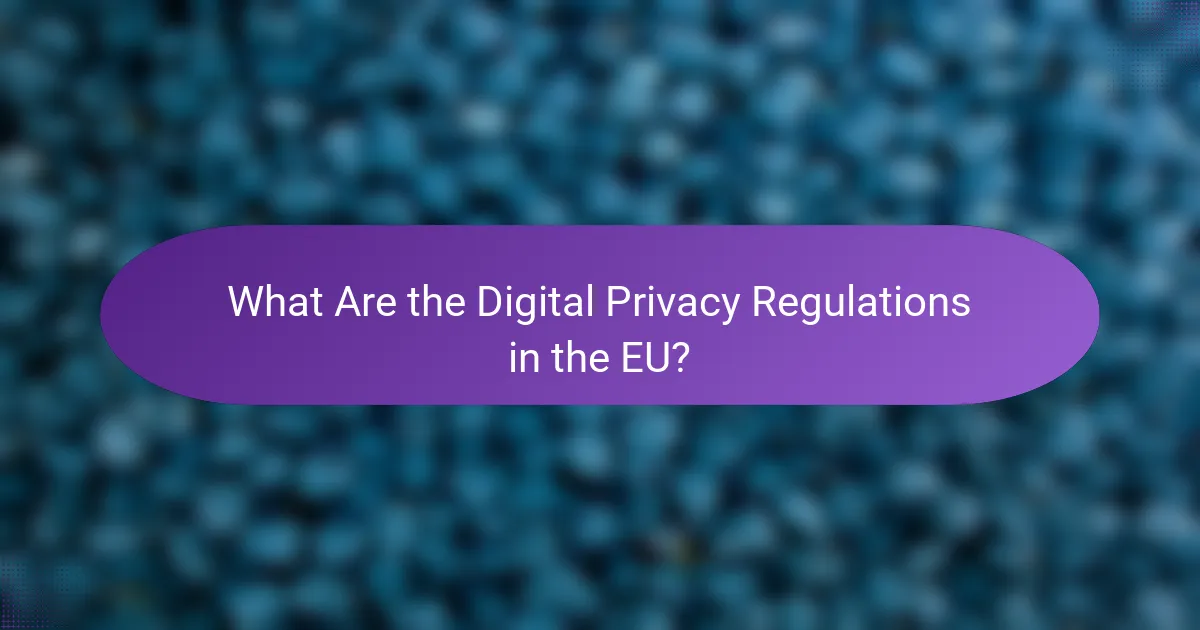
What Are the Digital Privacy Regulations in the EU?
The European Union has established several key regulations to protect digital privacy, most notably the General Data Protection Regulation (GDPR) and the ePrivacy Directive. These regulations set strict guidelines on how personal data is collected, processed, and stored, ensuring that individuals have greater control over their information.
General Data Protection Regulation (GDPR)
The GDPR, implemented in 2018, is a comprehensive data protection law that applies to all EU member states. It mandates that organizations must obtain explicit consent from individuals before processing their personal data and provides rights such as data access, rectification, and erasure.
Organizations must also appoint a Data Protection Officer (DPO) if they handle large volumes of personal data. Non-compliance can result in hefty fines, reaching up to 4% of annual global turnover or €20 million, whichever is higher.
ePrivacy Directive
The ePrivacy Directive complements the GDPR by focusing specifically on electronic communications and privacy. It governs the use of cookies, requiring websites to obtain consent from users before storing or accessing information on their devices.
This directive also covers confidentiality in communications, ensuring that users’ privacy is maintained in electronic messaging services. Organizations must clearly inform users about data collection practices and provide options to manage their preferences.
Data Protection Impact Assessments (DPIAs)
DPIAs are a key component of GDPR compliance, particularly for projects that may pose a high risk to individuals’ privacy. Organizations are required to conduct these assessments to identify and mitigate potential risks before processing personal data.
A DPIA should outline the nature, scope, context, and purposes of the data processing, as well as assess risks to individuals’ rights and freedoms. This proactive approach helps organizations to ensure compliance and build trust with users regarding their data handling practices.
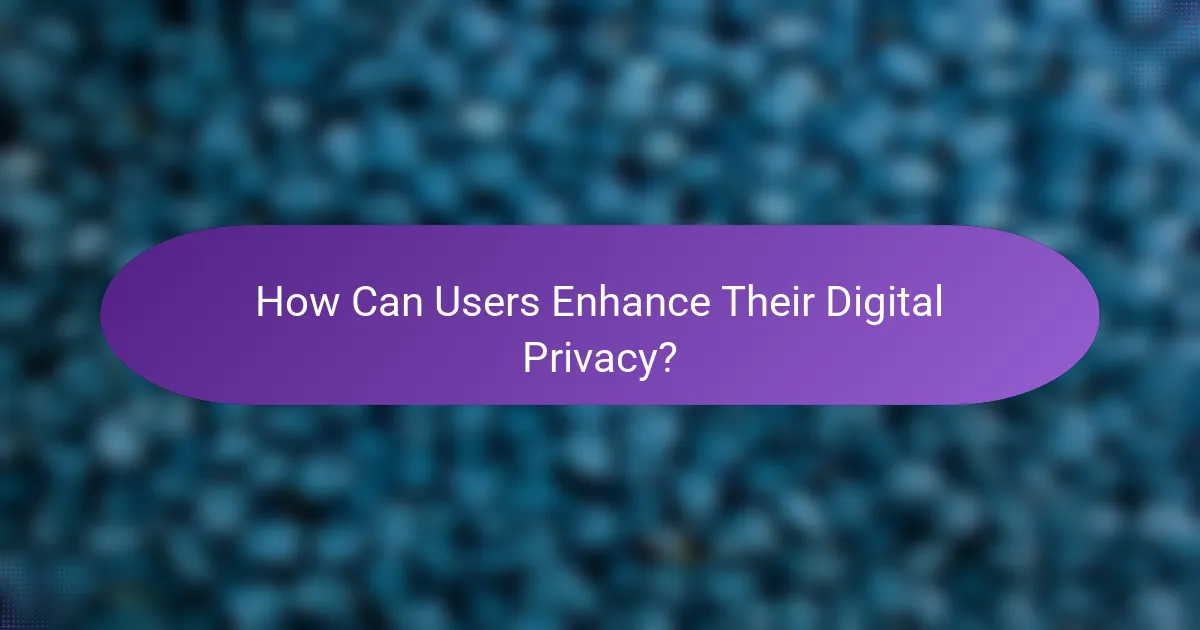
How Can Users Enhance Their Digital Privacy?
Users can enhance their digital privacy by adopting specific practices and tools that protect their personal information online. Key strategies include using VPNs, enabling two-factor authentication, and regularly updating privacy settings across various platforms.
Using VPNs for Secure Browsing
A Virtual Private Network (VPN) encrypts your internet connection, making it more difficult for third parties to track your online activities. By masking your IP address, a VPN helps maintain anonymity while browsing, which is particularly useful when using public Wi-Fi networks.
When selecting a VPN, consider factors such as speed, server locations, and privacy policies. Look for providers that do not log user activity and offer strong encryption standards. Popular options include NordVPN, ExpressVPN, and CyberGhost.
Implementing Two-Factor Authentication
Two-factor authentication (2FA) adds an extra layer of security by requiring not only a password but also a second form of verification, such as a text message code or authentication app. This significantly reduces the risk of unauthorized access to your accounts.
To implement 2FA, enable it on all accounts that offer this feature, especially for email and financial services. Use authentication apps like Google Authenticator or Authy for better security compared to SMS-based verification.
Regularly Updating Privacy Settings
Regularly reviewing and updating privacy settings on social media and online accounts is crucial for maintaining control over your personal information. Many platforms allow users to customize who can see their posts, friend requests, and profile details.
Check privacy settings at least once every few months. Adjust settings to limit data sharing and consider disabling features that track your location or activity. Familiarize yourself with the privacy policies of the services you use to understand how your data is handled.
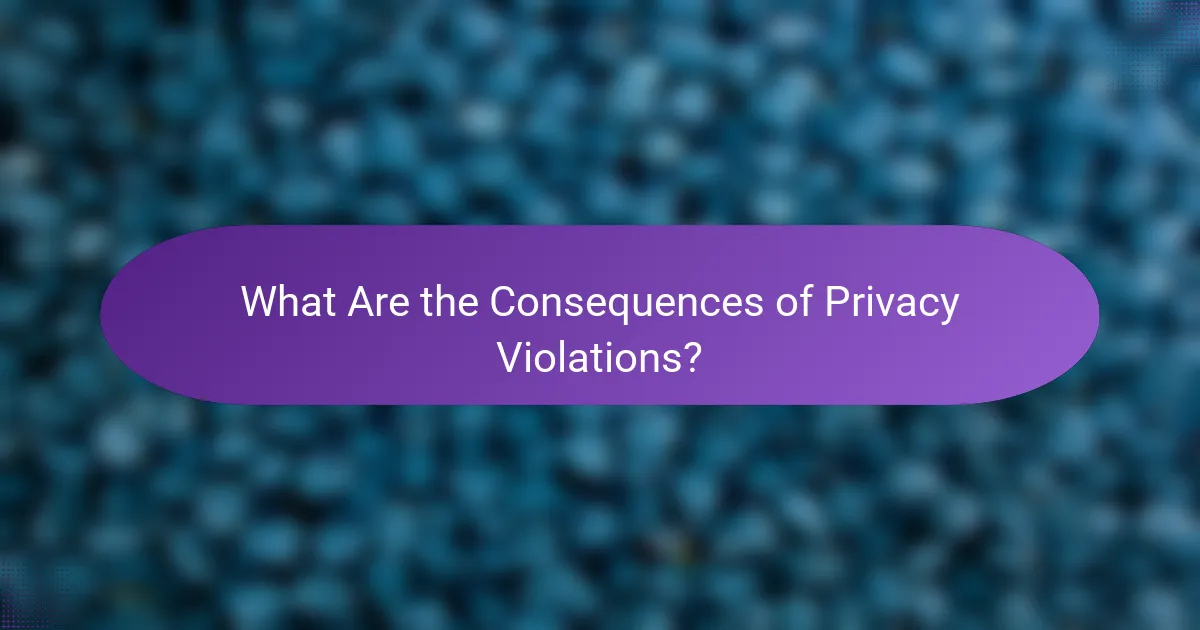
What Are the Consequences of Privacy Violations?
Privacy violations can lead to significant repercussions for companies and individuals alike. These consequences include legal penalties, a decline in consumer trust, and potential financial compensation for affected users.
Legal Penalties for Companies
Companies that violate privacy regulations may face severe legal penalties, including hefty fines and sanctions. For instance, under the General Data Protection Regulation (GDPR) in the European Union, fines can reach up to 4% of a company’s global annual revenue or €20 million, whichever is higher.
In addition to fines, companies may also be subject to lawsuits from affected individuals or groups. These legal actions can further escalate costs and damage a company’s reputation.
Loss of Consumer Trust
When privacy violations occur, consumer trust often diminishes significantly. Customers are less likely to engage with companies that have a history of mishandling personal data, which can lead to decreased sales and customer loyalty.
Rebuilding trust can take considerable time and effort, requiring companies to implement stronger data protection measures and transparent communication strategies. This process may involve public apologies, changes in policy, and enhanced security protocols.
Financial Compensation for Affected Users
Affected users may be entitled to financial compensation following a privacy violation. This compensation can vary widely, depending on the severity of the breach and the jurisdiction. In some cases, users may receive settlements that cover damages or losses incurred due to the violation.
In the United States, for example, class-action lawsuits can result in compensation for affected individuals, often amounting to hundreds or thousands of dollars per person. Companies should be prepared to address these claims promptly to mitigate further reputational damage.
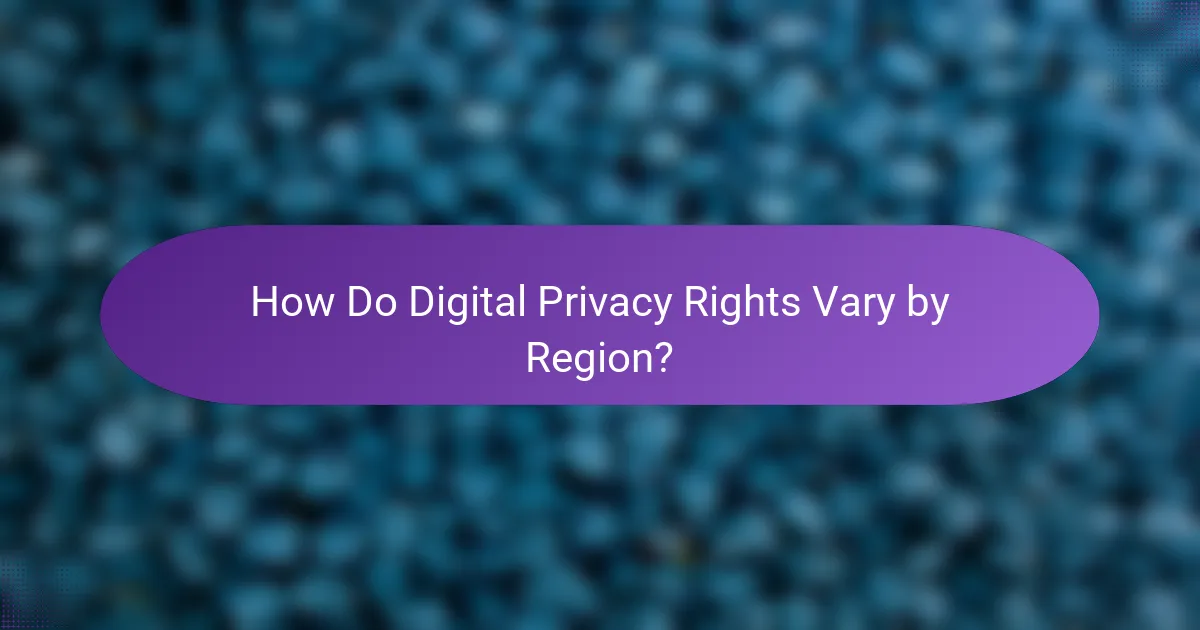
How Do Digital Privacy Rights Vary by Region?
Digital privacy rights differ significantly across regions, influenced by local laws, cultural attitudes, and enforcement mechanisms. In general, the European Union has more stringent regulations compared to the United States, focusing on user consent and data protection.
Comparative Analysis of US vs EU Regulations
The United States employs a sectoral approach to digital privacy, meaning regulations vary by industry rather than a comprehensive framework. Key laws like the Health Insurance Portability and Accountability Act (HIPAA) and the Children’s Online Privacy Protection Act (COPPA) address specific sectors, but there is no overarching federal law akin to the EU’s General Data Protection Regulation (GDPR).
In contrast, the EU’s GDPR sets a high standard for data protection, emphasizing user consent, data minimization, and the right to be forgotten. Organizations must implement clear privacy policies and obtain explicit consent from users before processing their data, which can lead to significant compliance costs for businesses operating within the EU.
For individuals, this means that EU residents generally enjoy stronger protections regarding their personal data. For example, users in the EU can request access to their data and demand its deletion, while similar rights in the US may not be as robust or uniformly enforced across different states.
